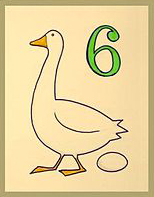Le sixième jour de Noël, mon amour m’a donné : six oies pondeuses…
(On the sixth day of Christmas, my true love gave to me: six geese a-laying…)
This is a Christmas hit in the making, I tell you.
1. une oie / l’oie / les oies (goose/geese) – be aware that because oies (pronounced “wah”) begins with a vowel, we need to “liaise” it with les or six, meaning the words get pronounced together by turning the ‘s’ or ‘x’ into ‘z’: les_oies (“lay-zwah“) and six_oies (“see-zwah”).
From now on, it gets really tricky to translate this song. Pay attention, class!
2. pondeuses – the verb is pondre (to lay [eggs]) and “pondeuses” roughly means female “layers [of eggs]” (if male geese could lay eggs, they’d be “pondeurs” but the word oie is feminine and so it must agree in gender with that). I’ve seen both pondant and couvant (couver: to sit on / incubate) in translation efforts (I admit “pondant” was my first guess) but having consulted no fewer than four French natives, this was universally rejected as terrible French. We have to accept that “pondeuses” doesn’t quite capture “geese a-laying” but we’ll come to this later in line eight when we have no better option because we need to consider the poetry of the line as well as the sense. Which brings me to the next lesson:
3. -ant endings for -ing. French present participles (les participes présents) are usually formed by taking the verb’s stem and adding –ant in the same way you add -ing in English (to lay => laying). However, danger! beware! present participles are almost never used in the way we use them in English. The full rules are a little too complex to explain in this post, so if you want to learn them, sign up! Notice a present tense sentence like “L’oie pond des oeufs” (the goose is laying eggs) just uses the present tense conjugation of pondrem and if you wanted “the geese were laying” you’d probably want the imperfect tense (l’imparfait).
The real lesson: never translate single words: translate a sentence’s meaning!
It’s so much easier to learn French by doing.
More: 5th Day | The 12 Days of Christmas | 7th Day
